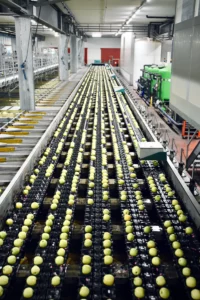 The Food and Beverage (F&B) industry plays a significant role in our daily lives, providing sustenance and pleasure to millions worldwide. However, behind the scenes of this bustling industry lies a complex web of regulations, safety standards, and hazardous materials that require careful management. One such essential aspect is the management of Safety Data Sheets (SDS), which are critical documents detailing the potential hazards, handling procedures, and emergency response measures for chemicals used in the F&B industry. In this article, we delve into why SDS management is paramount to the food and beverage sector.
The Food and Beverage (F&B) industry plays a significant role in our daily lives, providing sustenance and pleasure to millions worldwide. However, behind the scenes of this bustling industry lies a complex web of regulations, safety standards, and hazardous materials that require careful management. One such essential aspect is the management of Safety Data Sheets (SDS), which are critical documents detailing the potential hazards, handling procedures, and emergency response measures for chemicals used in the F&B industry. In this article, we delve into why SDS management is paramount to the food and beverage sector.
Ensuring Employee Safety
The well-being of employees should always be a top priority for any industry. In the F&B sector, workers handle various chemicals, from cleaning agents to food additives. These substances may pose risks if mishandled or if proper safety measures aren’t followed. SDSs provide comprehensive information on handling, storage, and emergency procedures, ensuring employees know potential hazards and how to mitigate risks. By effectively managing SDSs, companies can reduce workplace accidents, injuries, and illnesses, fostering a safer work environment.
Compliance with Regulations
The F&B industry is subject to a myriad of regulations imposed by governmental bodies to ensure the safety and quality of products. These regulations often mandate that businesses maintain accurate and up-to-date SDSs for all chemicals they use. Failure to comply with these regulations can result in severe consequences, including fines, production halts, and reputational damage. Effective SDSs management ensures that a company complies with local, regional, and international regulations, demonstrating a commitment to safety and responsibility.
Preventing Cross-Contamination
In the F&B industry, preventing cross-contamination is vital to ensure the integrity and safety of products. This is particularly crucial when handling allergens or processing different types of foods. SDSs provide information on proper cleaning procedures and the compatibility of various chemicals. By following these guidelines, companies can reduce the risk of cross-contamination, protecting consumers and avoiding costly recalls or legal actions.
Emergency Preparedness
Preparing for emergencies is a cornerstone of effective risk management in any industry. Accidental spills, leaks, or chemical reactions can occur unexpectedly, potentially leading to hazardous situations. SDSs contain essential information on emergency response, including first aid measures, firefighting instructions, and containment procedures. By having easy access to accurate SDSs, companies can minimize the impact of emergencies, protect employees, and prevent environmental damage.
Supplier and Customer Relations
Effective SDS management extends beyond a company’s internal operations. Suppliers often provide raw materials, additives, and chemicals to F&B businesses. Requesting and verifying accurate SDSs from suppliers ensures that the materials received are safe and compliant. Moreover, maintaining transparent SDS information can foster trust and collaboration between suppliers and customers, enhancing the overall supply chain efficiency and product quality.
To wrap things up
Safety, compliance, and responsible practices are paramount in the dynamic and intricate world of the Food and Beverage industry. Safety Data Sheet (SDS) management is a cornerstone of these efforts, guiding businesses in adequately handling, storing, and disposing of chemicals. By prioritizing SDS management, F&B companies can create a safer work environment, adhere to regulations, prevent contamination, respond effectively to emergencies, and build stronger relationships within the industry. In an era where consumer awareness and regulatory scrutiny are on the rise, proactive SDS management is not just an option but an essential component of success in the F&B sector.


